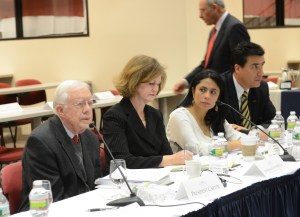* Versión en inglés abajo

Presidido por el ex presidente Jimmy Carter, se celebró el 5 de marzo un encuentro privado con embajadores ante la Organización de los Estados Americanos (OEA) referido al actual proceso de reforma de la Comisión Interamericana de Derechos Humanos (CIDH), el cual está entrando este mes en su fase final. La reunión fue co-auspiciada por Katya Salazar, Directora Ejecutiva de DPLF y el Decano Claudio Grossman de American University y permitió la realización de un debate abierto y franco sobre el actual proceso de reforma de la CIDH. Entre otros, asistieron los embajadores de México, Colombia, Chile, Brasil, Costa Rica, Paraguay, Uruguay, Bolivia, Ecuador, Venezuela, EE.UU., Canadá, Jamaica y Haití. También participaron el Secretario General de la OEA, José Miguel Insulza, el presidente de la CIDH, José de Jesús Orozco, y el Secretario Ejecutivo, Emilio Alvarez.
Antes de abrir la mesa de debate, el Presidente Carter se refirió al importante rol de la CIDH en la región y recordó que si bien el sistema interamericano de derechos humanos fue creado durante un período en el que prevalecían dictaduras militares en el hemisferio, las democracias también son imperfectas y requieren de un sistema que les ayude a fortalecer sus propios esfuerzos para asegurar la protección de derechos humanos. Posteriormente le pidió al Embajador de México –quien presidió anteriormente el Consejo Permanente – que brindara un análisis del estado actual del proceso de reforma. También se interesó por conocer las opiniones de los representantes de México, Colombia y Brasil sobre la propuesta de reforma de su reglamento y de sus prácticas recientemente presentada por la CIDH. En el marco de un diálogo de absoluto respeto, Carter también quiso comprender las críticas de otros Estados al documento de la CIDH. Para ello, se dirigió directamente a los embajadores de Ecuador, Venezuela y Bolivia quienes manifestaron sus desacuerdos con algunos aspectos de la propuesta de reforma pero aclararon que no tenían interés en debilitar el trabajo de la CIDH. El encuentro constituyó una oportunidad para el intercambio de opiniones entre altas autoridades de la OEA y el Presidente Carter, quien expresó a los embajadores de la OEA, al Secretario General y las autoridades de la CIDH su interés en participar de un segundo debate sobre la CIDH en el futuro cercano.
President Carter meets with OAS States to discuss reform of the Inter-American Human Rights System
President Carter led a private meeting the 5th of March with ambassadors to the Organization of American States (OAS) to discuss the current Inter-American Commission on Human Rights (IACHR) reform process, a process that is entering its final stage this month. The meeting, co-convened by Katya Salazar, Executive Director of the Due Process of Law Foundation (DPLF) and Dean Claudio Grossman of American University, was an opportunity for those who participated to talk openly and frankly about the current CIDH reform process. Among those who participated in the meeting were the ambassadors of Mexico, Colombia, Chile, Brazil, Costa Rica, Paraguay, Uruguay, Bolivia, Ecuador, Venezuela, USA, Canada, Jamaica and Haiti. Also present were OAS General Secretary José Miguel Insulza, the president of the IACHR José de Jesús Orozco and Executive Secretary of the IACHR Emilio Alvarez.
Before opening the meeting for discussion, President Carter spoke of the important role that the IACHR has played in the region and noted that, while the inter-American human rights system was created during a time when military dictatorships were prevalent in the hemisphere, democracies are also imperfect and benefit from a system that helps them strengthen their own efforts to ensure the protection of human rights. He then proceeded to ask the Mexican Ambassador –who was president of the Permanent Council of the OAS in its last session- to give an analysis of the current situation of the reform process. He also asked the representatives from Mexico, Colombia and Brazil to give their opinion of the proposed reforms to their rules and practices presented by the IACHR. During this very respectful dialogue, President Carter also sought to understand the critiques other States had of the IACHR document, thus the ambassadors of Ecuador, Venezuela and Bolivia spoke of their disagreement with some aspects of the reform proposal while explaining that they were not interested in weakening the IACH. The meeting allowed for an exchange of opinions between high ranking OAS authorities and President Carter, who shared with the OAS Ambassadors, Secretary General and IACHR officials his interest in participating in a follow-up meeting in the near future.

Y de la solidaridad que? Triste que no sabemos definir un principio de los derechos humanos, como vamos luego a ser solidarios?
Me gustaMe gusta